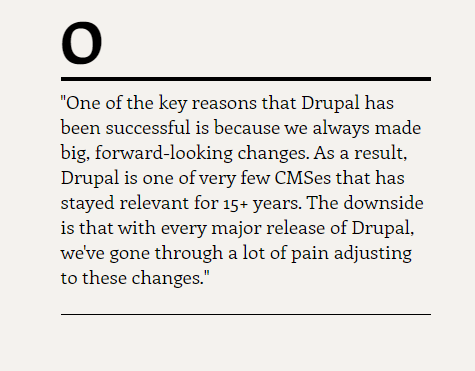
We’re excited to hear your project.
Let’s collaborate!

It scales like no other — built to accommodate huge amounts of content and massive volumes of traffic — it's incredibly robust, it's gone through a lot of innovative changes these +15 years and yet... Drupal's still less popular than WordPress. So, you cannot help wondering: “Why is WordPress so popular?”
What makes it more tempting than Drupal?
Since everyone agrees:
Drupal's a beast... It provides lots of robust “goodies” right out of the box, it powers some of the most high-loaded websites out there, it's developers' first choice for custom development...
Whereas WordPress is just a... popular blogging platform, right?
And yet, stats don't lie:
Any Wordpress vs Drupal in 2019 comparison would reveal to you that the first still rocks supreme.
Are you as puzzled by this paradox as we have been?
Well, then let's shine some light on this enigma. Here are the 3 strongest reasons why you would use WordPress over Drupal:
One of the most tempting benefits of choosing WordPress over... any other CMS is its unmatched flexibility:
It “spoils” you with an overwhelming no. of customization options.
+40,000 plugins, one or several for pretty much any functionality that you'd like to “inject” into your WordPress site. Lots of customization options to use on your WordPress theme: change fonts, color, layout, you name it.
You can easily get your blog/info portal/basic brochureware business site/gallery with a portfolio up and running in no time, then gradually turn it into a full-featured, custom-tuned website.
Note: I know what you might think: “But Drupal, too, is highly flexible. It ships with a rich collection of modules to... delve into and choose from.”
True, but, unlike Drupal with its load of modules, WordPress makes incorporating a plugin so much simpler. So much more accessible for... non-developers, as well.
From all the features of WordPress “guilty” for its popularity, its user-friendliness stands out as the most irresistible one.
WordPress caters to non-developers and junior developers, as well, unlike Drupal, which still carries its “For geeks only!” label. It's that accessible, that a non-technical user could get a light, basic WordPress site up and run in... 5 minutes.
Of course, custom-tuning it to perfectly fit your needs and preferences will require some extra time.
For any beginner, with zero web development experience, who doesn't want to get tangled up in PHP, HTML, and CSS, WordPress is a “declaration of independence”:
He gets a WYSIWYG editor that, conveniently enough, looks a whole lot like Word, and they get drag-and-drop functionality, as well. Assembling a simple website and then administering it and even further customizing it doesn't get any more straightforward than its gets with WordPress.
Why is WordPress so popular compared to Drupal?
The team behind it realized just what a pain it would be for end-users to break the backward compatibility of the platform that they got used to. What an ordeal their maintenance routine would become.
And so, WordPress users stuck to it. Its backward compatibility is, for them, the strongest proof that:
By comparison, Drupal 7's codebase was so frustratingly different from its predecessor's. Then, Drupal 8 came out as... a completely new world.
Just like Drupal's original creator, Dries Buytaert, pointed it out all too clearly:
Source: Dries Buytaert's blog.
The END!
These are the 3 main reasons why WordPress's more popular than Drupal: usability, backward-compatibility and flexibility/customization capabilities.
Curious now:
What other “hard to resist to” WP features would you have added to this list?
Photo by Fikret tozak on Unsplash

We’re excited to hear your project.
Let’s collaborate!